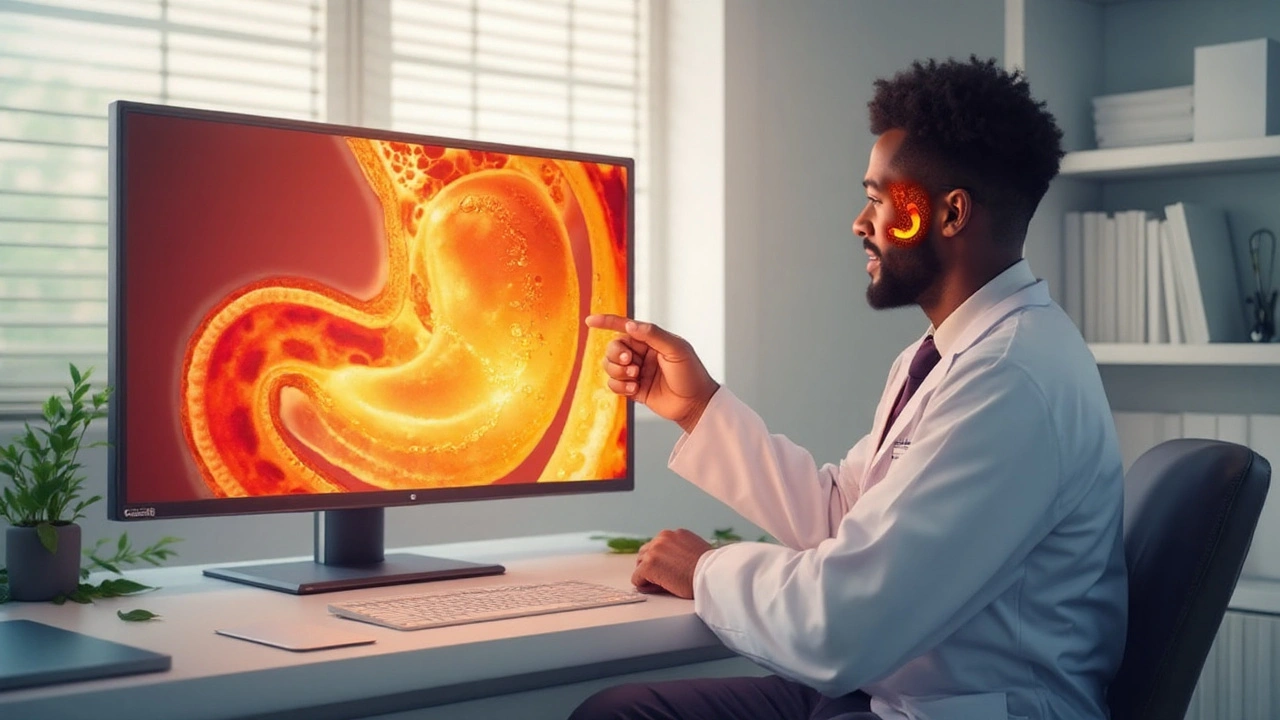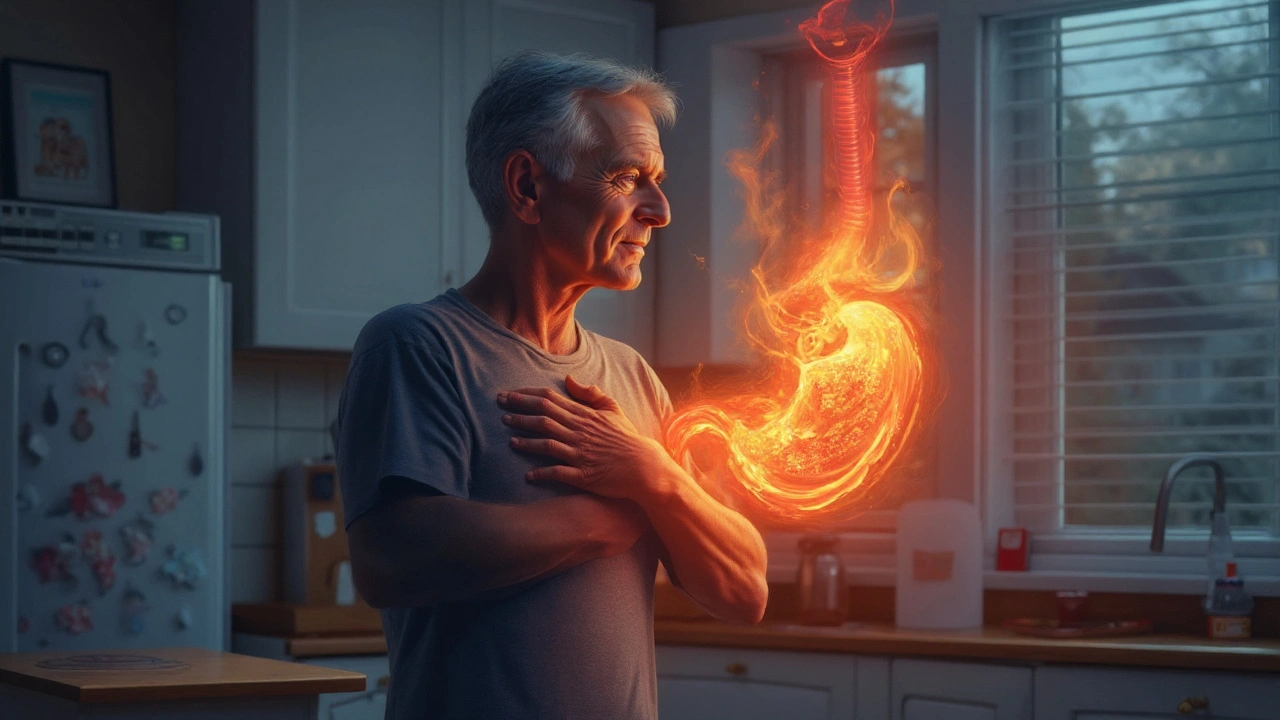Zollinger-Ellison Syndrome is a rare neuroendocrine disorder caused by gastrin‑secreting tumors (gastrinomas) that trigger massive gastric acid hypersecretion. The resulting acid overload can flood the esophagus, looking a lot like classic Gastroesophageal Reflux Disease. Understanding where the two overlap-and where they differ-helps patients and clinicians cut through confusing symptoms and choose the right therapy.
Quick Take
- ZES produces far higher acid levels than typical GERD.
- Both conditions share heartburn, but ZES often adds ulcers and diarrhea.
- High‑dose proton pump inhibitors (PPIs) are first‑line for ZES, while GERD may respond to lifestyle tweaks.
- Imaging (CT, endoscopy) and gastrin testing separate the diagnoses.
- Long‑term management may involve surgery for gastrinomas and somatostatin analogs.
What Is Zollinger‑Ellison Syndrome?
The hallmark of gastrinoma is unchecked production of gastrin, a hormone that tells parietal cells to pump out hydrochloric acid. When gastrin levels soar above 1,000pg/mL, the stomach churns out up to ten times the normal acid volume. This acid not only erodes the duodenal lining-causing refractory ulcers-but also overflows into the esophagus, igniting reflux.
How GERD Fits Into the Picture
Gastroesophageal Reflux Disease is a chronic condition where stomach contents repeatedly flow back into the esophagus, irritating its lining. The primary drivers are a weakened lower esophageal sphincter (LES) and increased intra‑abdominal pressure. While typical GERD stems from lifestyle factors-like obesity, caffeine, or hiatal hernia-acid overload from ZES can force the LES to fail, turning a secondary problem into a primary complaint.
Key Differences: ZES vs. GERD
| Feature | Zollinger‑Ellison Syndrome | GERD |
|---|---|---|
| Primary cause | Gastrin‑producing tumor (gastrinoma) | LES dysfunction, hiatal hernia, lifestyle |
| Acid output | 5‑10× normal (often > 100mmol/h) | Normal to mildly elevated |
| Typical symptoms | Severe heartburn, refractory duodenal ulcers, watery diarrhea | Heartburn, regurgitation, occasional chest pain |
| Diagnostic hallmark | Fasting gastrin > 1,000pg/mL + secretin stimulation test | Endoscopic erosive changes, pH monitoring |
| First‑line treatment | High‑dose PPIs + tumor‑directed therapy | Lifestyle modification + standard‑dose PPIs or H2 blockers |
Notice how the acid level and underlying cause separate the two. That difference dictates everything from lab work to surgical planning.

Diagnostic Pathway: From Symptoms to Confirmation
When a patient presents with burning chest pain that doesn’t quit with over‑the‑counter antacids, clinicians follow a stepwise approach:
- Take a detailed history-look for ulcer‑related pain, weight loss, or family history of MEN‑1 (multiple endocrine neoplasia type1).
- Measure fasting gastrin. Values above 1,000pg/mL strongly suggest ZES.
- Perform a secretin stimulation test. Paradoxical rise in gastrin after secretin confirms a gastrinoma.
- Visualize the tumor with CT scan or endoscopic ultrasound. Imaging helps locate primary lesions and metastases.
- Assess esophageal injury with endoscopic evaluation. Look for erosive esophagitis, Barrett’s changes, or ulcer scars.
In contrast, a straight‑forward GERD work‑up may skip gastrin testing and focus on pH monitoring, especially if acid‑suppression therapy works.
Treatment Strategies: Controlling the Acid Flood
The cornerstone for both conditions is acid suppression, but the dosage and adjuncts differ.
- Proton pump inhibitors (PPIs)-high‑dose omeprazole or esomeprazole (often 60mg twice daily) is required for ZES because standard doses can’t keep up with the acid surge.
- For classic GERD, a standard dose (20‑40mg daily) plus lifestyle tweaks-weight loss, head‑of‑bed elevation, avoiding late meals-usually suffices.
- When PPIs alone fail in ZES, somatostatin analog therapy (e.g., octreotide) can dampen gastrin release.
- Surgical resection of gastrinomas offers a potential cure, especially for localized tumors. In MEN‑1 patients, surgery is more nuanced due to multiple lesions.
- Adjunctive measures for GERD-antacids, H2 blockers, and behavioral changes-remain supportive but aren’t curative for ZES‑related reflux.
Because chronic acid overload damages the esophageal lining, many ZES patients also need surveillance for Barrett’s esophagus, a precancerous condition common in long‑standing GERD.
Managing Overlap: Practical Tips for Patients
If you’ve been told you have both ZES and GERD, consider these daily actions:
- Take PPIs exactly as prescribed-timing matters. Most work best 30 minutes before a meal.
- Avoid trigger foods that relax the LES: chocolate, mint, fatty meals, and caffeine.
- Stay upright for at least two hours after eating; gravity helps keep acid down.
- Maintain a healthy weight; excess belly fat raises intra‑abdominal pressure and worsens reflux.
- Schedule regular endoscopic check‑ups. Early detection of Barrett’s or ulcer recurrence improves outcomes.
Don’t forget to discuss any new symptoms-especially worsening pain or gastrointestinal bleeding-with your gastroenterologist promptly.
Related Concepts and Next Steps
Understanding ZES and GERD opens doors to a broader network of topics you might explore next:
- Multiple endocrine neoplasia type1 (MEN‑1)-the genetic syndrome that often harbors gastrinomas.
- Barrett’s esophagus-the metaplastic change that can follow chronic GERD.
- Helicobacter pylori infection-a common ulcer cause that can coexist with ZES and affect treatment decisions.
- Endoscopic ultrasound (EUS)-the imaging tool that pinpoints small gastrinomas.
- Somatostatin receptor scintigraphy-a nuclear scan that maps neuroendocrine tumor spread.
Each of these areas deepens your grasp of the acid‑related disease spectrum and informs better, personalized care.

Frequently Asked Questions
Can GERD cause Zollinger‑Ellison Syndrome?
No. GERD is a functional disorder of the lower esophageal sphincter, while ZES is driven by a gastrin‑producing tumor. However, the massive acid output from ZES can mimic or worsen GERD symptoms.
What lab test confirms Zollinger‑Ellison Syndrome?
A fasting gastrin level above 1,000pg/mL, followed by a secretin stimulation test that shows a paradoxical rise in gastrin, is diagnostic for ZES.
Why do ZES patients need higher doses of PPIs than typical GERD patients?
Because gastrinomas flood the stomach with acid far beyond normal levels, standard PPI doses can’t achieve sufficient pH control. High‑dose regimens are required to keep the acid in check.
Is surgery curative for Zollinger‑Ellison Syndrome?
Surgical removal can cure localized gastrinomas, but many patients have multiple or metastatic lesions, especially those with MEN‑1. In those cases, surgery is part of a broader management plan.
How often should a ZES patient undergo endoscopic surveillance?
Guidelines suggest an upper endoscopy every 1-2years to monitor for esophageal damage, ulcer recurrence, and early signs of Barrett’s esophagus.
Can lifestyle changes alone control reflux caused by ZES?
Lifestyle tweaks help reduce reflux severity, but they cannot offset the underlying acid overproduction in ZES. Medical therapy remains essential.
What role do somatostatin analogs play in treating ZES?
Somatostatin analogs like octreotide bind to receptors on gastrinomas and suppress gastrin release, lowering acid output when PPIs are insufficient.
Is there a genetic test for Zollinger‑Ellison Syndrome?
Genetic testing for MEN‑1 mutations is recommended when ZES appears in a family context or when multiple endocrine tumors are present. Isolated ZES usually isn’t inherited.


Jasmine Kara
September 22, 2025 AT 13:42so i had this weird heartburn for months and thought it was just stress or too much coffee… turns out it was a gastrinoma. like, who even knows this exists? glad i got tested.
Richie Lasit
September 23, 2025 AT 08:37huge shoutout to the doc who ordered the secretin test - most docs just throw a PPI at you and call it a day. this post saved me from years of misdiagnosis. if you’ve got unexplained ulcers + diarrhea? get your gastrin checked. no joke.
arthur ball
September 25, 2025 AT 06:03okay but imagine your stomach is just… on fire 24/7 and your doctor says ‘maybe eat less spicy food’? 🤯 i had ZES for 3 years before anyone took me seriously. they thought i was just a hypochondriac with bad habits. turned out my acid output was 8x normal. now i take 80mg of esomeprazole daily and still feel like a ghost half the time. if you’re on high-dose PPIs and still suffering? you’re not alone. we’re out here.
Harrison Dearing
September 26, 2025 AT 07:46lol at people who think ‘lifestyle changes’ fix this. 😂 like, yeah, i’ll just stop eating chocolate and suddenly my tumor stops making acid? nope. my gastrinoma’s still there, laughing at my kale smoothies. PPIs are my new best friends. also, octreotide shots? not cute. but they keep me alive. 🙃
Justice Ward
September 26, 2025 AT 18:23it’s wild how two conditions can look identical on the surface but be worlds apart underneath. it’s like two people crying - one because they lost a pet, the other because their house is on fire. same tears, different infernos. ZES isn’t just ‘bad GERD’ - it’s a biological rebellion. and honestly? the fact that we have treatments like somatostatin analogs and EUS is kind of miraculous. medicine is weirdly beautiful sometimes.
bhuvanesh kankani
September 28, 2025 AT 06:07as a medical professional from India, I appreciate this well-structured explanation. In our setting, ZES is often missed due to limited access to gastrin assays and endoscopic ultrasound. We rely heavily on clinical suspicion and response to PPIs. This post serves as an excellent educational tool for primary care physicians in resource-limited regions. Thank you.
maria norman
September 28, 2025 AT 22:28so let me get this straight - we spend billions on PPIs to treat a tumor that could’ve been caught with a $200 blood test… and yet, we still treat reflux like it’s a personal failing? 🤔 maybe the real disease is our healthcare system’s obsession with quick fixes over root causes. also, ‘lifestyle changes’? sure, i’ll just meditate my gastrinoma away. 😌
Iris Schaper
September 30, 2025 AT 22:26i had the same thing. thought it was acid reflux. took me 2 years to get diagnosed. docs kept saying ‘you’re too young for this’. guess what? i’m 34. and now i’m on octreotide. also, i spelled ‘gastrinoma’ wrong in my first google search. lol. no shame.
katerine rose
October 1, 2025 AT 21:01why are you all making this so complicated? just stop eating and you’ll be fine. duh. also, PPIs cause osteoporosis so you’re just trading one problem for another. i read it on a forum.
Selma Cey
October 1, 2025 AT 21:31what if all this is just a pharmaceutical scam? what if the ‘tumor’ is just inflammation? what if they’re making up gastrin levels to sell more drugs? i mean… think about it. why would nature make a tumor that just… makes acid? sounds like a plot twist from a bad medical drama.
Francis Pascoe
October 2, 2025 AT 03:15you people are pathetic. if you can’t control your diet, don’t blame the system. my grandpa had GERD and he never needed a blood test. he just didn’t eat late. you’re all weak. and yes, i know what ZES is - i read it once on WebMD. now go fix your life.
Richa Shukla
October 4, 2025 AT 00:13they dont want you to know this but ZES is caused by 5G and chemtrails. i know a guy whose cousin got diagnosed after living near a cell tower. also, PPIs are made by the government to make you dependent. your bones will turn to dust. dont trust the doctors. they work for big pharma. #ZESisACult
Chris Rowe
October 5, 2025 AT 13:53bruh… i thought this was a post about pizza. now i’m confused. also, gastrin? sounds like a rapper. 😴
Sushmita S
October 6, 2025 AT 12:40so i have this weird burning feeling… is it ZES? 😢 i just want to know if i’m dying or just ate too much curry. 🤷♀️
AnneMarie Carroll
October 7, 2025 AT 10:08you’re all missing the point. This isn’t about acid. It’s about control. Who gave doctors the right to measure your hormones? Who authorized these tests? You’re being manipulated. I’ve had this symptom for 15 years and I’ve never seen a lab report. I trust my intuition. And my intuition says… you’re all being gaslit.
John K
October 7, 2025 AT 18:58AMERICA IS THE ONLY COUNTRY THAT HAS THIS PROBLEM. EVERYONE ELSE JUST EATS LESS SPICY FOOD. WE DON’T NEED BLOOD TESTS. WE NEED TO STOP BEING SOFT. #MAKEACIDGREATAGAIN
Richie Lasit
October 8, 2025 AT 14:59@3686 - you’re right, lifestyle changes help… but only if you’re not being flooded with acid like a bathtub with the tap on full blast. PPIs aren’t a crutch - they’re oxygen. And if you think osteoporosis is worse than perforated ulcers, you haven’t lived.